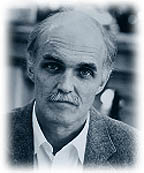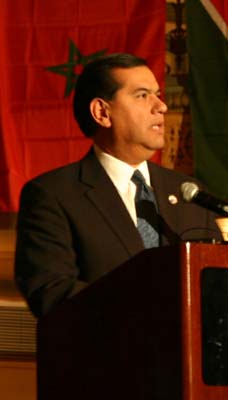
He also acquired Sebastian Junger's "Perfect Storm" for only $35,000. The book later became a best seller, and Junger had his pick of publishers willing to pay more than Norton, a company not known for high advances. But he stayed with Lawrence, whom he credits with helping him find a structure for "Storm," which contained multiple stories.
Cameroon RPCV Starling Lawrence has been at Norton since 1969 and has edited such best-selling authors as Patrick O'Brian
Publishing: A heartfelt story from industrial age
By Dinitia Smith The New York Times
THURSDAY, MAY 18, 2006
Most people in the book world know Starling Lawrence as editor in chief of W.W. Norton & Co., the publishing house. And some know him as a writer of books of his own. But few know that Lawrence is also the great-grandson of Charles Coffin, the first president of General Electric, who made that company into a giant of American industry.
Now Lawrence has wound together strands of his family heritage and his childhood imaginings into a novel, "The Lightning Keeper," published in March by HarperCollins. It is a story about the birth of the industrial age and the role of electricity in its development, in which, of course, General Electric played a major part.
The novel is also about the unsung role of immigrants in creating American industry, both as workers and as inventors of the technology that made it possible. "I hope my great-grandfather won't be unhappy," Lawrence said with a laugh about his depiction of General Electric in the novel.
The Los Angeles Times called "The Lightning Keeper" "a subtle and moving novel, an old-fashioned narrative that addresses modern questions of ethnicity and belonging." It is, the reviewer Mark Essig wrote, "a romance of technology and of the heart."
The novel is partly based on stories Lawrence heard when he spent summers at the estate his family has occupied for nearly a century on Canaan Mountain in northwest Connecticut. The family was once the biggest landowner in the area. As a boy, Lawrence rode his horse through the forests where the charcoal pits were a ghostly reminder of the iron industry that once flourished in the area.
At the edge of the estate was a strange castle, built by Michael Pupin, the immigrant Serb scientist who invented the long-distance relay device, which made possible the widespread use of Alexander Graham Bell's telephone.
Lawrence heard lurid stories about a love affair between Pupin and a woman known locally as the Widow Jenkins, whose house still stands cater- cornered from Pupin's castle. Supposedly, Pupin tunneled under the road to connect their homes and built a love nest for them in the woods, a house that still stands. "For an adolescent with an active imagination," Lawrence said, "it was heaven."
The novel revolves around Toma Pekocevic, a fictional immigrant from Montenegro who is a combination of Pupin and Nikola Tesla, another Balkan scientist and a genius of 20th-century technology who successfully championed alternating current against Thomas Edison's direct current.
Toma falls in love with Harriet Bigelow, the beautiful heiress of a Connecticut iron-making dynasty that has come down in the world. He immigrates to the United States, finds his way to Norfolk and invents a device to help her father's failing enterprise.
But Harriet marries the much older Senator Fowler Truscott, who has bankrolled the business. It is a loveless marriage. Truscott is loosely based on Frederic Walcott, a Republican senator from Connecticut from 1929 to 1935 and a friend of Lawrence's grandfather Starling Childs, whose large, elegant house still stands near Lawrence's.
Toma goes on to create a revolutionary hydroelectric turbine and General Electric tries to appropriate it. A modest, gentlemanly Charles Coffin makes a few brief appearances in the book as "the true face" of American capitalism. (He was also called that in the Almanac of Electrical Engineering in 1926.) But his protégé, Charles Steinmetz, a real General Electric scientist who was famously obsessed with lightning, pursues the use of Toma's invention with ruthless energy.
The book is illustrated with photographs of the old ironworks that processed ore from nearby Salisbury, and of Coffin. In 1892 the electric company he headed merged with Edison General Electric. Coffin, Lawrence's maternal great-grandfather, took over. "Edison went off in a sulk because the company wasn't going to be named after him and he wasn't going to run it," Lawrence said. "So he invented the phonograph."
As a boy, Lawrence followed his father, uncle and siblings to Phillips Exeter Academy, where, he said, "I was a fat introvert." He went to Princeton, another family tradition; after graduating, he served in the Peace Corps in Cameroon.
Lawrence has been at Norton since 1969 and has edited such best-selling authors as Patrick O'Brian. He also acquired Sebastian Junger's "Perfect Storm" for only $35,000. The book later became a best seller, and Junger had his pick of publishers willing to pay more than Norton, a company not known for high advances. But he stayed with Lawrence, whom he credits with helping him find a structure for "Storm," which contained multiple stories.
Lawrence began writing fiction in the 1980s, but "the combination of children and the day job kept me from getting very serious about it until the 1990s," he said. In 1996 he published a story collection, "Legacies," and the next year he published a novel, "Montenegro," a fictional re-creation of Pupin's Balkan childhood and youth.
Lawrence said that his family was no longer connected to General Electric.
He admits that writing the novel was an effort to come to terms with the legacy of his great-grandfather and of General Electric, which is today one of the biggest corporations in the world.
"I have nothing but feelings of admiration for my great-grandfather," Lawrence said. "Yet there's something about the magnitude of the enterprise, of GE, that he set in motion, that is disturbing. The triumph of man over nature, which could be symbolized by General Electric, fills me with a sense of trepidation and foreboding. This is my attempt to figure out my formulation of it."
Most people in the book world know Starling Lawrence as editor in chief of W.W. Norton & Co., the publishing house. And some know him as a writer of books of his own. But few know that Lawrence is also the great-grandson of Charles Coffin, the first president of General Electric, who made that company into a giant of American industry.
Now Lawrence has wound together strands of his family heritage and his childhood imaginings into a novel, "The Lightning Keeper," published in March by HarperCollins. It is a story about the birth of the industrial age and the role of electricity in its development, in which, of course, General Electric played a major part.
The novel is also about the unsung role of immigrants in creating American industry, both as workers and as inventors of the technology that made it possible. "I hope my great-grandfather won't be unhappy," Lawrence said with a laugh about his depiction of General Electric in the novel.
The Los Angeles Times called "The Lightning Keeper" "a subtle and moving novel, an old-fashioned narrative that addresses modern questions of ethnicity and belonging." It is, the reviewer Mark Essig wrote, "a romance of technology and of the heart."
The novel is partly based on stories Lawrence heard when he spent summers at the estate his family has occupied for nearly a century on Canaan Mountain in northwest Connecticut. The family was once the biggest landowner in the area. As a boy, Lawrence rode his horse through the forests where the charcoal pits were a ghostly reminder of the iron industry that once flourished in the area.
At the edge of the estate was a strange castle, built by Michael Pupin, the immigrant Serb scientist who invented the long-distance relay device, which made possible the widespread use of Alexander Graham Bell's telephone.
Lawrence heard lurid stories about a love affair between Pupin and a woman known locally as the Widow Jenkins, whose house still stands cater- cornered from Pupin's castle. Supposedly, Pupin tunneled under the road to connect their homes and built a love nest for them in the woods, a house that still stands. "For an adolescent with an active imagination," Lawrence said, "it was heaven."
The novel revolves around Toma Pekocevic, a fictional immigrant from Montenegro who is a combination of Pupin and Nikola Tesla, another Balkan scientist and a genius of 20th-century technology who successfully championed alternating current against Thomas Edison's direct current.
Toma falls in love with Harriet Bigelow, the beautiful heiress of a Connecticut iron-making dynasty that has come down in the world. He immigrates to the United States, finds his way to Norfolk and invents a device to help her father's failing enterprise.
But Harriet marries the much older Senator Fowler Truscott, who has bankrolled the business. It is a loveless marriage. Truscott is loosely based on Frederic Walcott, a Republican senator from Connecticut from 1929 to 1935 and a friend of Lawrence's grandfather Starling Childs, whose large, elegant house still stands near Lawrence's.
Toma goes on to create a revolutionary hydroelectric turbine and General Electric tries to appropriate it. A modest, gentlemanly Charles Coffin makes a few brief appearances in the book as "the true face" of American capitalism. (He was also called that in the Almanac of Electrical Engineering in 1926.) But his protégé, Charles Steinmetz, a real General Electric scientist who was famously obsessed with lightning, pursues the use of Toma's invention with ruthless energy.
The book is illustrated with photographs of the old ironworks that processed ore from nearby Salisbury, and of Coffin. In 1892 the electric company he headed merged with Edison General Electric. Coffin, Lawrence's maternal great-grandfather, took over. "Edison went off in a sulk because the company wasn't going to be named after him and he wasn't going to run it," Lawrence said. "So he invented the phonograph."
As a boy, Lawrence followed his father, uncle and siblings to Phillips Exeter Academy, where, he said, "I was a fat introvert." He went to Princeton, another family tradition; after graduating, he served in the Peace Corps in Cameroon.
Lawrence has been at Norton since 1969 and has edited such best-selling authors as Patrick O'Brian. He also acquired Sebastian Junger's "Perfect Storm" for only $35,000. The book later became a best seller, and Junger had his pick of publishers willing to pay more than Norton, a company not known for high advances. But he stayed with Lawrence, whom he credits with helping him find a structure for "Storm," which contained multiple stories.
Lawrence began writing fiction in the 1980s, but "the combination of children and the day job kept me from getting very serious about it until the 1990s," he said. In 1996 he published a story collection, "Legacies," and the next year he published a novel, "Montenegro," a fictional re-creation of Pupin's Balkan childhood and youth.
Lawrence said that his family was no longer connected to General Electric.
He admits that writing the novel was an effort to come to terms with the legacy of his great-grandfather and of General Electric, which is today one of the biggest corporations in the world.
"I have nothing but feelings of admiration for my great-grandfather," Lawrence said. "Yet there's something about the magnitude of the enterprise, of GE, that he set in motion, that is disturbing. The triumph of man over nature, which could be symbolized by General Electric, fills me with a sense of trepidation and foreboding. This is my attempt to figure out my formulation of it."





















